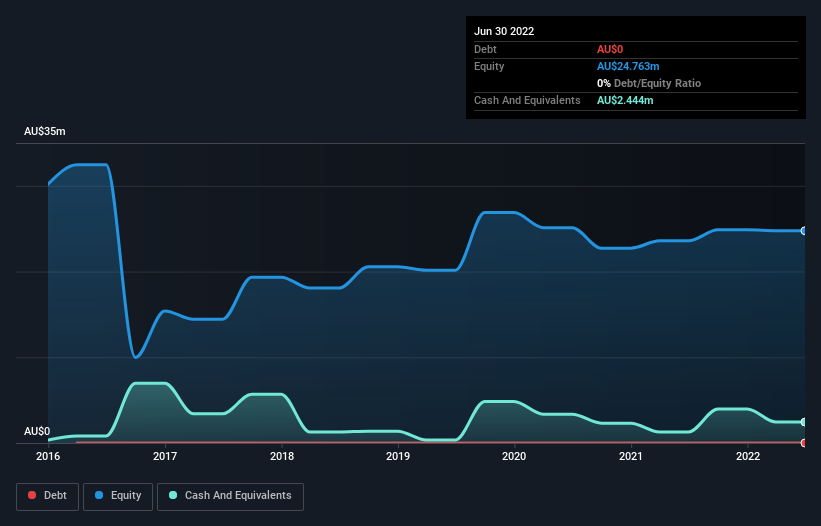- Australia
- /
- Metals and Mining
- /
- ASX:TON
Here's Why We're Watching Triton Minerals' (ASX:TON) Cash Burn Situation
There's no doubt that money can be made by owning shares of unprofitable businesses. For example, although software-as-a-service business Salesforce.com lost money for years while it grew recurring revenue, if you held shares since 2005, you'd have done very well indeed. But while history lauds those rare successes, those that fail are often forgotten; who remembers Pets.com?
So should Triton Minerals (ASX:TON) shareholders be worried about its cash burn? In this report, we will consider the company's annual negative free cash flow, henceforth referring to it as the 'cash burn'. Let's start with an examination of the business' cash, relative to its cash burn.
Our analysis indicates that TON is potentially overvalued!
How Long Is Triton Minerals' Cash Runway?
A company's cash runway is calculated by dividing its cash hoard by its cash burn. In June 2022, Triton Minerals had AU$2.4m in cash, and was debt-free. Looking at the last year, the company burnt through AU$3.5m. So it had a cash runway of approximately 8 months from June 2022. That's quite a short cash runway, indicating the company must either reduce its annual cash burn or replenish its cash. You can see how its cash balance has changed over time in the image below.

How Is Triton Minerals' Cash Burn Changing Over Time?
Because Triton Minerals isn't currently generating revenue, we consider it an early-stage business. Nonetheless, we can still examine its cash burn trajectory as part of our assessment of its cash burn situation. Over the last year its cash burn actually increased by a very significant 56%. While this spending increase is no doubt intended to drive growth, if the trend continues the company's cash runway will shrink very quickly. Admittedly, we're a bit cautious of Triton Minerals due to its lack of significant operating revenues. So we'd generally prefer stocks from this list of stocks that have analysts forecasting growth.
How Easily Can Triton Minerals Raise Cash?
Given its cash burn trajectory, Triton Minerals shareholders should already be thinking about how easy it might be for it to raise further cash in the future. Generally speaking, a listed business can raise new cash through issuing shares or taking on debt. One of the main advantages held by publicly listed companies is that they can sell shares to investors to raise cash and fund growth. We can compare a company's cash burn to its market capitalisation to get a sense for how many new shares a company would have to issue to fund one year's operations.
Since it has a market capitalisation of AU$37m, Triton Minerals' AU$3.5m in cash burn equates to about 9.2% of its market value. Given that is a rather small percentage, it would probably be really easy for the company to fund another year's growth by issuing some new shares to investors, or even by taking out a loan.
So, Should We Worry About Triton Minerals' Cash Burn?
On this analysis of Triton Minerals' cash burn, we think its cash burn relative to its market cap was reassuring, while its cash runway has us a bit worried. Looking at the factors mentioned in this short report, we do think that its cash burn is a bit risky, and it does make us slightly nervous about the stock. On another note, Triton Minerals has 5 warning signs (and 2 which don't sit too well with us) we think you should know about.
Of course, you might find a fantastic investment by looking elsewhere. So take a peek at this free list of interesting companies, and this list of stocks growth stocks (according to analyst forecasts)
Valuation is complex, but we're here to simplify it.
Discover if Triton Minerals might be undervalued or overvalued with our detailed analysis, featuring fair value estimates, potential risks, dividends, insider trades, and its financial condition.
Access Free AnalysisHave feedback on this article? Concerned about the content? Get in touch with us directly. Alternatively, email editorial-team (at) simplywallst.com.
This article by Simply Wall St is general in nature. We provide commentary based on historical data and analyst forecasts only using an unbiased methodology and our articles are not intended to be financial advice. It does not constitute a recommendation to buy or sell any stock, and does not take account of your objectives, or your financial situation. We aim to bring you long-term focused analysis driven by fundamental data. Note that our analysis may not factor in the latest price-sensitive company announcements or qualitative material. Simply Wall St has no position in any stocks mentioned.
About ASX:TON
Triton Minerals
Primarily engages in the exploration, evaluation, and development of mineral properties in Mozambique.
Flawless balance sheet with slight risk.
Similar Companies
Market Insights
Community Narratives




